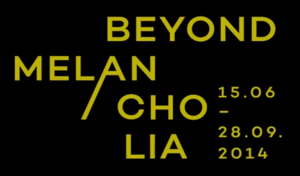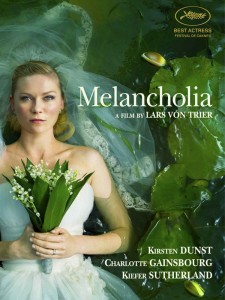by Jason Smith for FILMbutton
What I absolutely love about Lars Von Tier’s Melancholia is its – accurately frank – depiction of depression: a gargantuan planet with an erratic orbit, and a gravitational pull whose affects are felt across great distances that cause much disruption, as it’s predicted to collide with Earth. In attempting to explain the affects of Melancholia, we are given – symbolically speaking – contrasting views between science and faith.
In the first of two parts, Justine, (Kirsten Dunst) and her husband Michael (Alexander Skasgaard) enjoy an opulent wedding reception; however, and for reasons, at first, unapparent, Justine cannot enjoy herself. Instead, she retreats, choosing to wonder about her sister’s estate, in a quasi, hypnotic state, acting erratically, and focused upon the distant planet (which seems to be calling-out to her). In fact, her unease becomes such that none can console her. Needless to say, the night outlasts the marriage. Thus is felt the first affects of planet Melancholia.
In the second part, Justine, who’s almost catatonic, lives with her sister Claire (Charlotte Gainsbourg) and Claire’s husband Jack (Kiefer Sutherland) and their child Leo (Cameron Spurr). Claire’s concern for her sister gradually turns to concerns about Melancholia, as reports of its nearness to Earth increase. To comfort her, Jack provides much scientific data about the planet’s amicable passage; and when this prediction seems likely (as also aided by Leo’s device, showing Melancholia’s withdrawal), a sense of relief occurs; however, the calm doesn’t last.
As shown by its erratic movements, Melancholia returns. At this point, Jack iterates his faith in the sciences; however, Claire, much like Justine, has become more despondent, vigorously disbelieving her husbands claims, simply because she can’t reconcile his feelings with what she ‘believes’ she knows. Wtih Melancholia’s collision apparent, Justine (now more coherent) arises to console her sister and Leo. Jack, realizing his error and makes a hard choice.
As a metaphor about depression, Von Tier’s Melancholia aptly depicts the condition’s all-encompassing aspects. Yes, depression feels like some other, larger planet; yes, it operates according to its own laws; yes, it can prove fatale to all involved. The movie, however, does present us with a choice: we can become slaves to these erratic impulses; or, in the face of such an influence, we can chose to bear that influence, developing a strength which might allow us to not be as identified, thereby granting us a measure of control over that which controlled us.
If anything, Melancholia is also a movie about the consequences of choice in the face of adversity.
Jason Smith is an actor & arts aficionado who loves theatre, film and anything arts related. When he is not on a TV or film set, you might just see him in the background of the newest opera playing in Toronto.



Comments are closed.